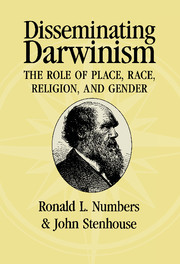Book contents
- Frontmatter
- Contents
- List of contributors
- Acknowledgments
- Introduction
- 1 Science, region, and religion: the reception of Darwinism in Princeton, Belfast, and Edinburgh
- 2 Darwin down under: science, religion, and evolution in Australia
- 3 Darwinism in New Zealand, 1859–1900
- 4 Environment, culture, and the reception of Darwin in Canada, 1859–1909
- 5 Darwinism in the American South
- 6 Darwinism, American Protestant thinkers, and the puzzle of motivation
- 7 Exposing Darwin's “hidden agenda”: Roman Catholic responses to evolution, 1875–1925
- 8 American Jewish responses to Darwin and evolutionary theory, 1860–1890
- 9 Black responses to Darwinism, 1859–1915
- 10 “The irrepressible woman question”: women's responses to evolutionary ideology
- Index
7 - Exposing Darwin's “hidden agenda”: Roman Catholic responses to evolution, 1875–1925
Published online by Cambridge University Press: 06 July 2010
- Frontmatter
- Contents
- List of contributors
- Acknowledgments
- Introduction
- 1 Science, region, and religion: the reception of Darwinism in Princeton, Belfast, and Edinburgh
- 2 Darwin down under: science, religion, and evolution in Australia
- 3 Darwinism in New Zealand, 1859–1900
- 4 Environment, culture, and the reception of Darwin in Canada, 1859–1909
- 5 Darwinism in the American South
- 6 Darwinism, American Protestant thinkers, and the puzzle of motivation
- 7 Exposing Darwin's “hidden agenda”: Roman Catholic responses to evolution, 1875–1925
- 8 American Jewish responses to Darwin and evolutionary theory, 1860–1890
- 9 Black responses to Darwinism, 1859–1915
- 10 “The irrepressible woman question”: women's responses to evolutionary ideology
- Index
Summary
In 1931, not long after the theory of evolution by means of natural selection had gained widespread acceptance in the scientific community, the Catholic Encyclopaedic Dictionary rendered the official Roman Catholic teaching on the subject as follows:
EVOLUTION, EVOLUTIONISM. Transformism, or Evolutionism, means the theory of the transformation of species only, but evolution is a more general and universal theory which is applied to the physical world, to the realm of ethics, to man and to society (Spencer). Absolute evolutionism is not justified by physical science which has established without doubt the stability of species, without ever discovering veritable specific transformations; moreover, it is condemned by metaphysics which refuses to admit that effects can be more perfect than their efficient causes; and “extreme” evolution denies the special act of creation of life, attributing the whole process to a natural development from inorganic matter. The doctrine of the natural development of all the species of the animal and vegetable world from a few primitive types created by God is moderate evolution. Catholics are free to believe in moderate evolution, excluding the evolution of man. Animals, as distinguished from man, are devoid of reason. Hence the animal soul, i.e., the principle which gives an animal life, is essentially material. Hence, man's soul, though depending on material things for its activities, being essentially spiritual, the evolution of man as a whole from the lower animal is impossible.
- Type
- Chapter
- Information
- Disseminating DarwinismThe Role of Place, Race, Religion, and Gender, pp. 173 - 208Publisher: Cambridge University PressPrint publication year: 1999
- 7
- Cited by



